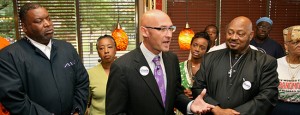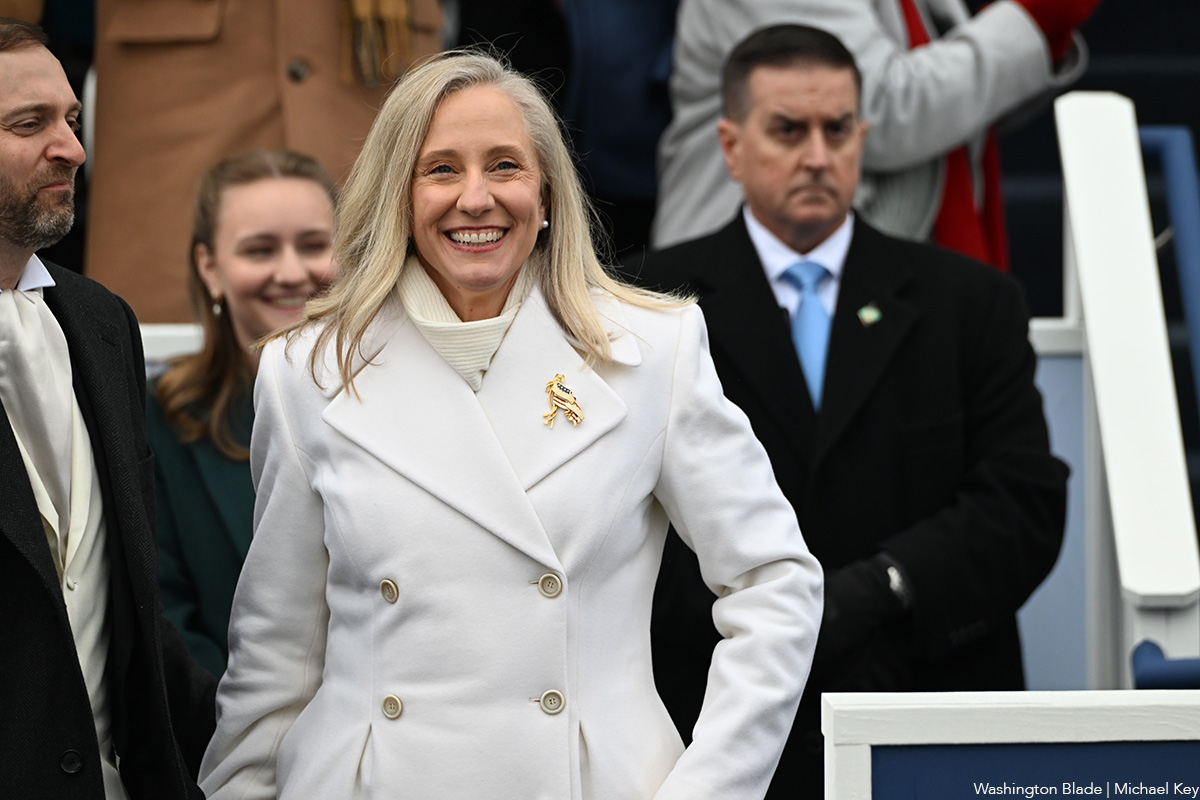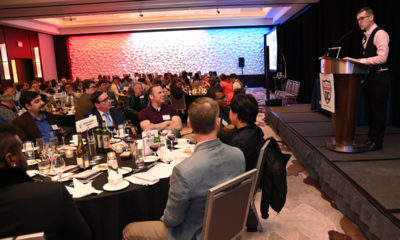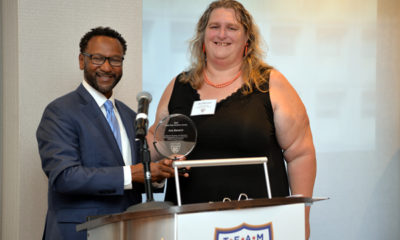Local
Controversial minister endorses gay D.C. Council candidate
Rev. Wilson called ‘lesbianism’ threat to youth, families

D.C. City Council candidate Clark Ray (center) accepted an endorsement this week from a controversial Baptist minister. (Photo courtesy of Clark Ray for Council)
Gay D.C. City Council candidate Clark Ray drew mixed reactions from the LGBT community this week when he accepted the endorsement of a minister who preached in 2005 that “lesbianism is about to take over our community.”
Ray, who is challenging LGBT-supportive Council member Phil Mendelson, noted that Rev. Willie Wilson, pastor of Union Temple Baptist Church in Anacostia, apologized for the remarks about lesbians and gay men in his widely reported 2005 sermon.
Ray said he and Wilson developed a friendship while meeting regularly over the past two years on a wide range of issues beginning when Ray served as director of the city’s Department of Parks & Recreation.
“What we’re trying to do today and I think what this is an example of is building a bridge,” Ray said at Denny’s Restaurant in Southeast D.C., where Wilson announced the endorsement Wednesday and pledged to work hard for Ray’s election in the Sept. 14 Democratic primary.
“We don’t agree on everything, the reverend and I,” Ray said at the announcement. “And I disagree on a number of topics that we’ve talked about. But the deal is we can talk about it. And I can learn from him and he can learn from me. … So I welcome the endorsement.”
Wilson told the gathering that as parks and recreation director, Ray showed a strong interest in the issues and concerns of residents in wards 7 and 8 and helped Wilson with several projects related to city recreation and senior citizen centers.
“We developed a very close friendship,” Wilson said. “I vigorously support his campaign for at-large member of the D.C. City Council. I will personally canvas my community to get out the vote in support of Clark Ray for at-large Council member.”
Members of the Gay & Lesbian Activists Alliance criticized Ray for accepting Wilson’s endorsement, triggering a debate on the group’s blog, GLAAforum.org.
Bob Summersgill, a former GLAA president, pointed to published reports and transcripts of Wilson’s 2005 sermon, saying Ray’s acceptance of the endorsement appeared to be “pandering to one group while alienating others.”
In his sermon July 3, 2005, Wilson asserted that black families were being harmed by a growing number of young women who were rejecting men and forming romantic relationships with other women.
“Lesbianism is about to take over our community,” he said. “I’m talking about young girls.”
In remarks that drew expressions of outrage by LGBT activists and women’s rights groups, Wilson recounted how his son had complained that he could not find a date for his high school prom.
“He said, ‘Dad, I ain’t got nobody to take to the prom because all the girls in my class are gay. There ain’t but two of them straight and both are ugly.’”
Wilson continued, “But when you get down to this thing, woman falling down on another woman, strapping herself up with something. It ain’t real. That thing ain’t got no feeling in it. It ain’t natural.”
Turning to his concern about gay men, Wilson told his congregation, “Any time somebody got to slap some grease on your behind, and stick something in you, it’s something wrong with that. Your butt ain’t made for that.”
Following a flurry of news reports about the sermon, which began when the Blade broke the story after obtaining an recorded copy of Wilson’s sermon, Wilson issued an apology that some in the LGBT community said wasn’t sincere.
“Some people in the community were offended by the language I used in my message, which I will admit was intemperate,” Wilson told the Washington Post. “I apologize to anyone who was hurt by the language that I used.”
The Post reported that Wilson added, “I do not apologize for raising a very serious issue concerning our young girls, some as young as 10 and 11 years of age, who are engaging in same-sex relations.”
Three months later, in October 2005, Wilson angered gay activists on a separate matter when he reportedly blocked black gay activist and former Clinton administration official Keith Boykin from speaking at an African American civil rights rally on the National Mall known as the Millions More Movement March. Wilson served as national executive director of the march.
Boykin was scheduled to speak at the event following extensive negotiations between the National Black Justice Coalition, an LGBT group, and organizers of the Millions More Movement. Nation of Islam leader Louis Farrakhan, the event’s lead organizer, initially agreed to allow a gay speaker and didn’t object when activists decided Boykin would be a speaker representing the black LGBT community. Wilson objected late to Boykin taking the stage and his appearance was scrapped.
Ray said he believes Wilson has “come a long way” since his 2005 actions. Ray noted that while Wilson personally opposes same-sex marriage on religious grounds, he chose not to become involved with efforts by his fellow ministers to campaign against the city’s same-sex marriage law passed by the City Council in December.
In a statement released this week, Wilson said, “I have enjoyed getting to know and working with Clark. He knows that I support full civil equality for all residents of the District of Columbia — including those who comprise the Gay, Lesbian, Bisexual, Transgender & Questioning (GLBTQ) Community.”
Ray supporter Joel Lawson, a gay activist and Dupont Circle civic leader, said Ray’s acceptance of the Wilson endorsement was an important conciliatory gesture.
“I think Clark is showing leadership in building a bridge through and across some very uncomfortable territory,” Lawson said. “We have gay marriage now. We’ve won. The question now is do we expand our discussions with one another within this family of D.C. residents.
“They have forged a very improbable connection,” he said of Ray and Wilson’s relationship. “And I think that is progress.”
But in the GLAA blog, Mitch Wood, the group’s president, expressed skepticism about how much Wilson may have changed in his views on LGBT rights.
“I am all for building bridges across cultures and demographics — but anyone from the gay and lesbian community should be exceptionally wary about embracing a ‘man of God’ with such a tarnished and divisive record,” he said.
Virginia
Va. activists preparing campaign in support of repealing marriage amendment
Referendum about ‘dignity and equal protection under the law’

Virginia voters in November will vote on whether to repeal their state’s constitutional amendment that defines marriage as between a man and a woman.
Democratic Gov. Abigail Spanberger on Feb. 6 signed House Bill 612 into law. It facilitates a referendum for voters to approve the repeal of the 2006 Marshall-Newman Amendment. Although the U.S. Supreme Court’s Obergefell ruling extended marriage rights to same-sex couples across the country in 2014, codifying marriage equality in Virginia’s constitution would protect it in the state in case the decision is overturned.
Maryland voters in 2012 approved Question 6, which upheld the state’s marriage equality law, by a 52-48 percent margin. Same-sex marriage became legal in Maryland on Jan. 1, 2013.
LGBTQ advocacy groups and organizations that oppose marriage equality mounted political campaigns ahead of the referendum.

Equality Virginia has been involved in advancing LGBTQ rights in Virginia since 1989.
Equality Virginia is working under its 501c3 designation in conjunction with Equality Virginia Advocates, which operates under a 501c4 designation, to plan campaigns in support of repealing the Marshall-Newman Amendment.
The two main campaigns on which Equality Virginia will be focused are education and voter mobilization. Reed Williams, the group’s director of digital engagement and narrative, spoke with the Washington Blade about Equality Virginia’s plans ahead of the referendum.
Williams said an organization for a “statewide public education campaign” is currently underway. Williams told the Blade its goal will be “to ensure voters understand what this amendment does and why updating Virginia’s constitution matters for families across the commonwealth.”
The organization is also working on a “robust media and voter mobilization campaign to identify and turn out voters” to repeal Marshall-Newman Amendment. Equality Virginia plans to work with the community members to guarantee voters are getting clear and accurate information regarding the meaning of this vote and its effect on the Virginia LGBTQ community.
“We believe Virginia voters are ready to bring our constitution in line with both the law and the values of fairness and freedom that define our commonwealth,” said Equality Virginia Executive Director Narissa Rahaman. “This referendum is about ensuring loving, committed couples and their families are treated with dignity and equal protection under the law.”
The Human Rights Campaign has also worked closely with Equality Virginia.
“It’s time to get rid of outdated, unconstitutional language and ensure that same sex couples are protected in Virginia,” HRC President Kelley Robinson told the Blade in a statement.
District of Columbia
D.C. police arrest man for burglary at gay bar Spark Social House
Suspect ID’d from images captured by Spark Social House security cameras

D.C. police on Feb. 18 arrested a 63-year-old man “of no fixed address” for allegedly stealing cash from the registers at the gay bar Spark Social House after unlawfully entering the bar at 2009 14th St., N.W., around 12:04 a.m. after it had closed for business, according to a police incident report.
“Later that day officers canvassing for the suspect located him nearby,” a separate police statement says. “63-year-old Tony Jones of no fixed address was arrested and charged with Burglary II,” the statement says.
The police incident report states that the bar’s owner, Nick Tsusaki, told police investigators that the bar’s security cameras captured the image of a man who has frequently visited the bar and was believed to be homeless.
“Once inside, the defendant was observed via the establishment’s security cameras opening the cash register, removing U.S. currency, and placing the currency into the left front pocket of his jacket,” the report says.
Tsusaki told the Washington Blade that he and Spark’s employees have allowed Jones to enter the bar many times since it opened last year to use the bathroom in a gesture of compassion knowing he was homeless. Tsusaki said he is not aware of Jones ever having purchased anything during his visits.
According to Tsusaki, Spark closed for business at around 10:30 p.m. on the night of the incident at which time an employee did not properly lock the front entrance door. He said no employees or customers were present when the security cameras show Jones entering Spark through the front door around 12:04 a.m.
Tsusaki said the security camera images show Jones had been inside Spark for about three hours on the night of the burglary and show him taking cash out of two cash registers. He took a total of $300, Tsusaki said.
When Tsusaki and Spark employees arrived at the bar later in the day and discovered the cash was missing from the registers they immediately called police, Tsusaki told the Blade. Knowing that Jones often hung out along the 2000 block of 14th Street where Spark is located, Tsusaki said he went outside to look for him and saw him across the street and pointed Jones out to police, who then placed him under arrest.
A police arrest affidavit filed in court states that at the time they arrested him police found the stolen cash inside the pocket of the jacket Jones was wearing. It says after taking him into police custody officers found a powdered substance in a Ziploc bag also in Jones’s possession that tested positive for cocaine, resulting in him being charged with cocaine possession in addition to the burglary charge.
D.C. Superior Court records show a judge ordered Jones held in preventive detention at a Feb. 19 presentment hearing. The judge then scheduled a preliminary hearing for the case on Feb. 20, the outcome of which couldn’t immediately be obtained.
District of Columbia
Judge rescinds order against activist in Capital Pride lawsuit
Darren Pasha accused of stalking organization staff, board members, volunteers

A D.C. Superior Court judge on Feb.18 agreed to rescind his earlier ruling declaring local gay activist Darren Pasha in default for failing to attend a virtual court hearing regarding an anti-stalking lawsuit brought against him by the Capital Pride Alliance, the group that organizes D.C.’s annual Pride events.
The Capital Pride lawsuit, initially filed on Oct. 27, 2025, accuses Pasha of engaging in a year-long “course of conduct” of “harassment, intimidation, threats, manipulation, and coercive behavior” targeting Capital Pride staff, board members, and volunteers.
In his own court filings without retaining an attorney, Pasha has strongly denied the stalking related allegations against him, saying “no credible or admissible evidence has been provided” to show he engaged in any wrongdoing.
Judge Robert D. Okum nevertheless on Feb. 6 approved a temporary stay-away order requiring Pasha to stay at least 100 feet away from Capital Pride’s staff, volunteers, and board members until the time of a follow-up court hearing scheduled for April 17. He reduced the stay-away distance from 200 yards as requested by Capital Pride.
In his two-page order issued on Feb. 18, Okun stated that Pasha explained that he was involved in a scooter accident in which he was injured and his phone was damaged, preventing him from joining the Feb. 6 court hearing.
“Therefore, the court finds there is a good cause for vacating the default,” Okun states in his order.
At the time he initially approved the default order at the Feb. 6 hearing that Pasha didn’t attend, Okun scheduled an April 17 ex parte proof hearing in which Capital Pride could have requested a ruling in its favor seeking a permanent anti-stalking order against Pasha.
In his Feb. 18 ruling rescinding the default order Okun changed the April 17 ex parte proof hearing to an initial scheduling conference hearing in which a decision on the outcome of the case is not likely to happen.
In addition, he agreed to consider Pasha’s call for a jury trial and gave Capital Pride 14 days to contest that request. The Capital Pride lawsuit initially called for a non-jury trial by judge.
One request by Pasha that Okum denied was a call for him to order Capital Pride to stop its staff or volunteers from posting information about the lawsuit on social media. Pasha has said the D.C.-based online blog called DC Homos, which Pasha claims is operated by someone associated with Capital Pride, has been posting articles portraying him in a negative light and subjecting him to highly negative publicity.
“The defendant has not set forth a sufficient basis for the court to restrict the plaintiff’s social media postings, and the court therefore will deny the defendant’s request in his social media praecipe,” Okun states in his order.
A praecipe is a formal written document requesting action by a court.
Pasha called the order a positive development in his favor. He said he plans to file another motion with more information about what he calls the unfair and defamatory reports about him related to the lawsuit by DC Homos, with a call for the judge to reverse his decision not to order Capital Pride to stop social media postings about the lawsuit.
Pasha points to a video interview on the LGBTQ Team Rayceen broadcast, a link to which he sent to the Washington Blade, in which DC Homos operator Jose Romero acknowledged his association with Capital Pride Alliance.
Capital Pride Executive Director Ryan Bos didn’t immediately respond to a message from the Blade asking whether Romero was a volunteer or employee with Capital Pride.
Pasha also said he believes the latest order has the effect of rescinding the temporary stay away order against him approved by Okun in his earlier ruling, even though Okun makes no mention of the stay away order in his latest ruling. Capital Pride attorney Nick Harrison told the Blade the stay away order “remains in full force and effect.”
Harrison said Capital Pride has no further comment on the lawsuit.




















